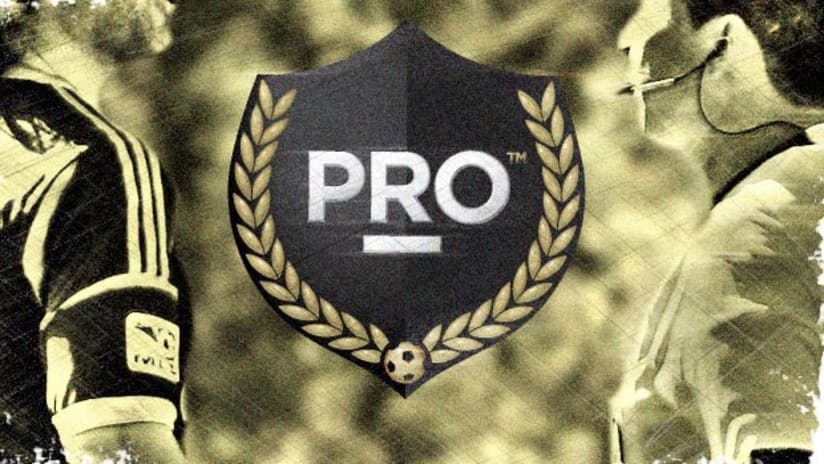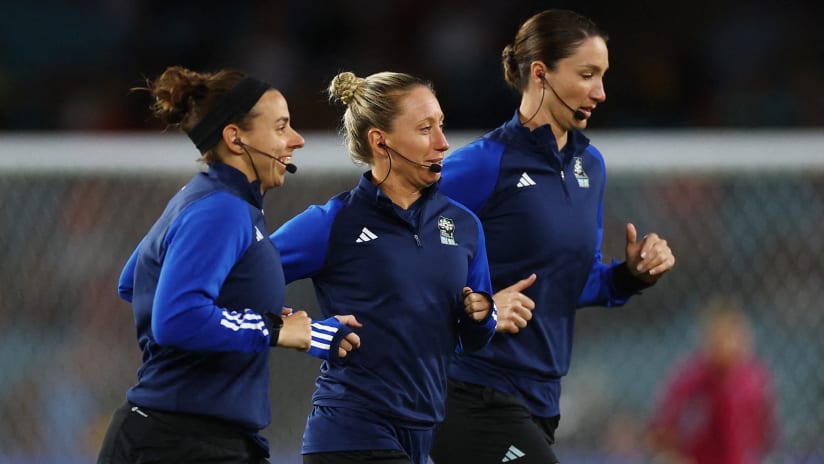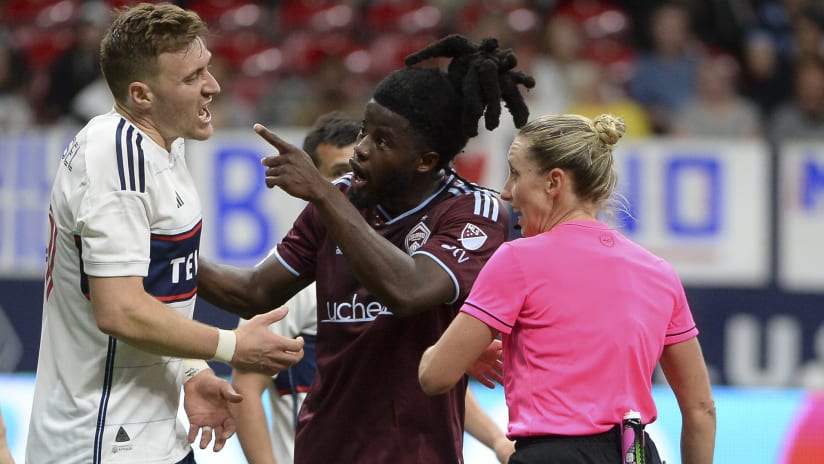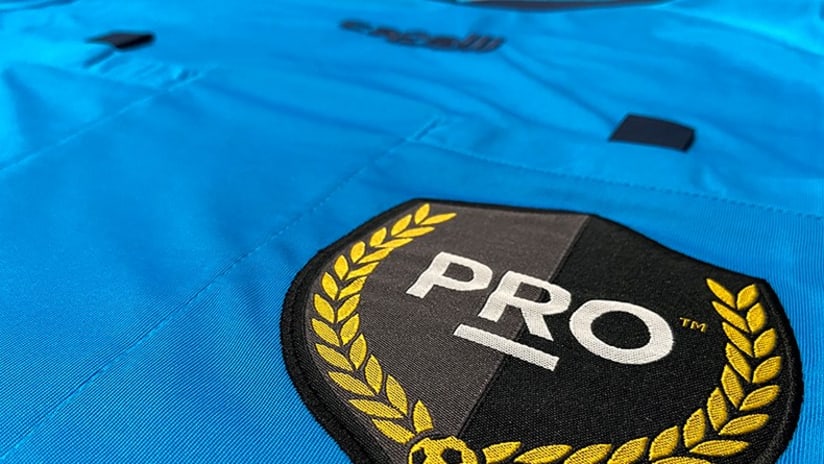THE WORD is MLSsoccer.com's weekly long-form series. This week, contributor John Bolster examines the first year of Major League Soccer's affiliation wtih the Professional Referee Organization, how it's changed the game and what players and coaches think of the challenges met and still to come.
There may be more thankless jobs in this world than refereeing – dental hygienists, sanitation workers and teachers come to mind – but you can probably count them on one hand.
Referees perform a function that’s as difficult as it is important, yet they are routinely disrespected by players, coaches, fans and pundits for their mistakes – while their best performances go unnoticed.
And when it comes to Major League Soccer, the referee’s predicament arguably has another layer of difficulty. Consider the situation when the league launched in 1996: There was an available pool of international players (the Valderramas and Etcheverrys) with elite-level experience, and there were American players – think John Harkes, Brian McBride and Eric Wynalda – who had the option of going to Europe to gain high-level experience.
But the referees available to MLS back then? They had no such option.
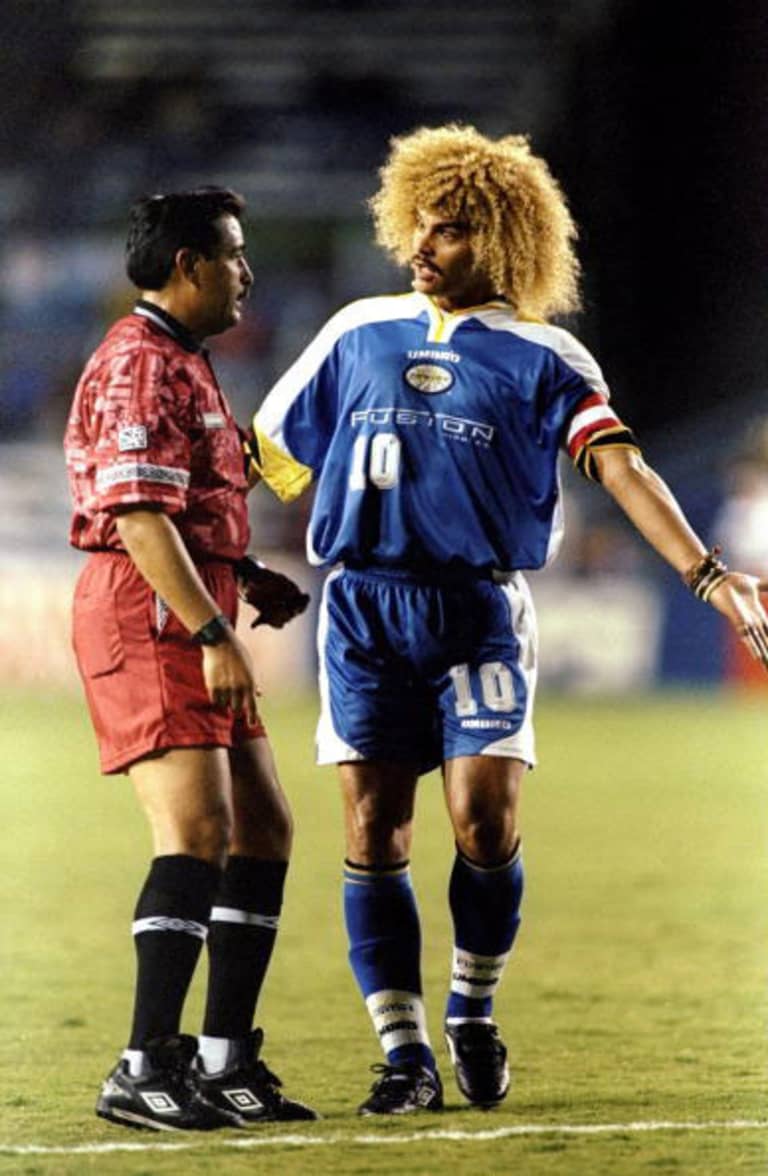
Former MLS superstar Carlos Valderrama questions a referee's call during a match in 1998. (Getty Images)
Is it possible, then, that the players had a head start on the refs in this league, and the refs have had to catch up?
“That’s a fascinating question,” says Nelson Rodriguez, MLS executive VP of competition, technical and game operations. “And one that I hadn’t considered before. I think there’s some merit to it. The fact that the players had the liberty, and the global market – and the officials up to now, had generally not had that opportunity – would, at least theoretically, lend credence to that argument.”
Whether or not you accept that proposition, you can’t deny the regular, and occasionally strident, complaints about the officiating that have issued from the mouths of MLS coaches, execs, players and fans through the years.
Just this month, Philadelphia coach John Hackworth and Portland boss Caleb Porter were both fined for making pointed and public criticisms of the refereeing in recent games, but they’re just the latest examples. LA Galaxy head coach Bruce Arena took a shot as well earlier this month after he felt a no-call cost his team a 1-0 loss to the Houston Dynamo, telling the media “the referee certainly screwed that play up big-time, but I’ll let [the league] deal with that.”
Several prominent players and coaches declined requests to be interviewed for this article, and one coach said he was afraid he’d be “opening Pandora’s box” if he got started on MLS refereeing. A well-established MLS midfielder said he was afraid he’d get fined if he commented on the record about the league’s officiating
So yes, whatever the root cause, it’s fair to say: Refereeing has been and continues to be something of a radioactive topic in MLS.
---
With that in mind, the league linked up with U.S. Soccer and the Canadian Soccer Association in 2010 to create a referee task force. There were several initiatives discussed, but the leading idea was to create an independent company to oversee the professional referees in the US and Canada.
Last year, that entity, the Professional Referee Organization (PRO), began its work, with former Premier League official Peter Walton in charge. PRO has instituted a number of significant changes in multiple areas, with the twin goals of increasing the quality of officiating and developing more elite-level refs in North America.
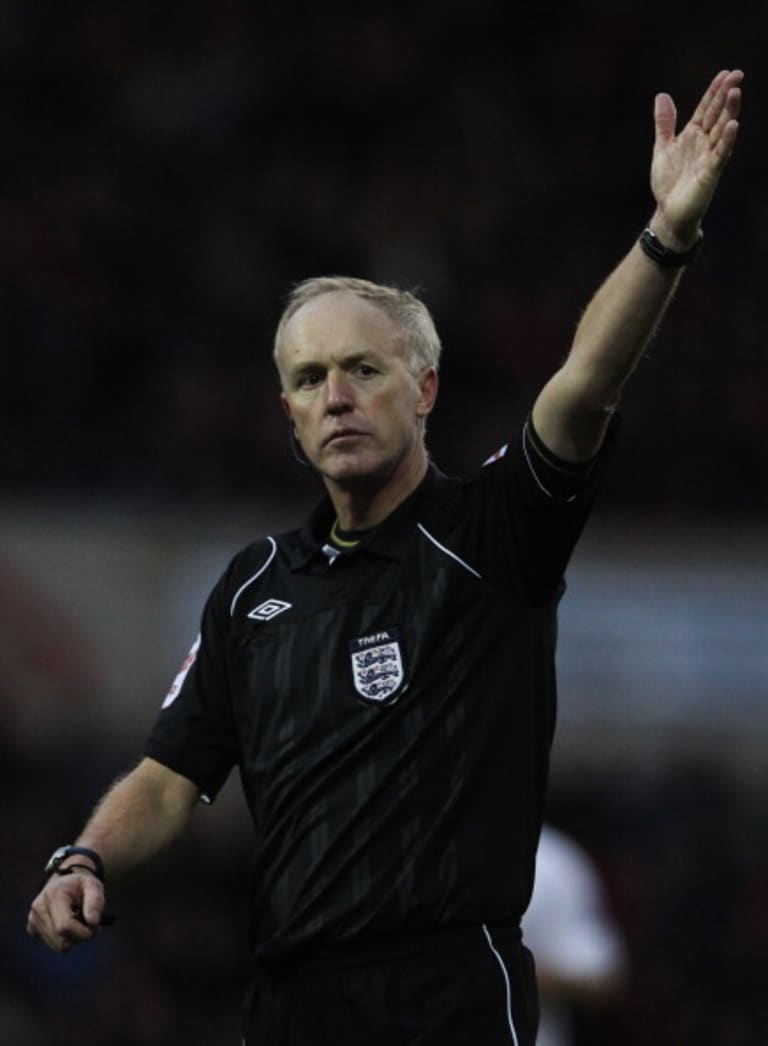
Peter Walton was an official in the English Premier League from 2003 to 2012, and is now the general manager of the Professional Referee Organization. (Getty Images)
They have two offices in New York City, one for office staff and the other housing the review center – “the nerve center” – which contains a bank of monitors that PRO staffers use to review MLS matches in real time each game-week.
PRO also evaluates MLS referees after every performance, employing “match-day assessors” who assign a mark to each official for every game, based on criteria PRO has devised. The refs receive a written evaluation several days after the game as well.
PRO has overhauled the refereeing culture on these shores, installed an extensive support system and training program for officials, and generally professionalized the endeavor to an extent unprecedented in North America.
YOU MAKE THE CALL: Did Alan Gordon deserve red in Portland?
But how are they doing, one year into the job? Has the officiating improved in MLS?
“What a great question to ask,” says Walton, 53, an affable Englishman whose dry sense of humor is perfectly suited to – or perhaps the product of – his lifelong occupation.
“I’d be a fool to say, ‘No it hasn’t,’ ” Walton continues, “but truthfully, it’s not for me to answer. It’s all about perception. From my angle, though, our referees are increasing at the same pace as the league.”
Actually, when you consider their starting point, they may be increasing faster than the pace of the league.
When Walton began in 2012, MLS had just two full-time officials, and all of the refs convened just twice a year for training events.
“Can you imagine someone like Peter Vermes or Sigi Schmid getting his players together just twice a year?” Walton asks.
Now, the league has nine full-time refs (by way of comparison, the Premier League has 15), and the zebras gather 22 times a year for training events, something Walton calls “a significant improvement.”
LISTEN: Peter Walton on ExtraTime Radio in November 2012
The officials now have three-day training sessions every two weeks during the season. At these events, Walton and his training development manager, Paul Rejer, go over clips from games to show the officials what they want, and what they don’t want. They have a sports scientist who monitors the referees’ nutrition, their fitness levels and their eyesight. They bring in stress-management experts who advise the refs on dealing with pressure, big crowds and national-TV atmospheres.
Coaches attend these sessions, too, to talk tactics and help enhance the officials’ understanding of the game.
PRO also has an office staff that handles logistical stuff, like travel, finances and administrative arrangements for the officials.
And in an effort to provide the maximum high-level experience to their referees, PRO has trimmed Major League Soccer’s pool of available officials from 37 to 21. The leaner crew gets more exposure to top-flight games, and, ideally, more seasoning and experience as time goes by.
---
The initiative is still in its infancy, but there are clear signs of its impact.
“I would say that what the program does is it kind of keeps everyone on their toes, holds people accountable,” says LA Galaxy associate head coach Dave Sarachan. “And I think by that everything increases. The concentration level increases, the physical demands of the referees increase. So I think the checks and balances that the PRO program put in place have been very beneficial.”
Portland Timbers owner Merritt Paulson, who was fined in 2012 for ripping MLS officials on Twitter, agrees.
“I’m a huge supporter of the initiative,” he says. “PRO basically took what had been a part-time occupation with sort of limited support, and made MLS official a full-fledged professional [job], with health benefits and a team of coaches to help them get better, an incentive system, to motivate better officiating.”
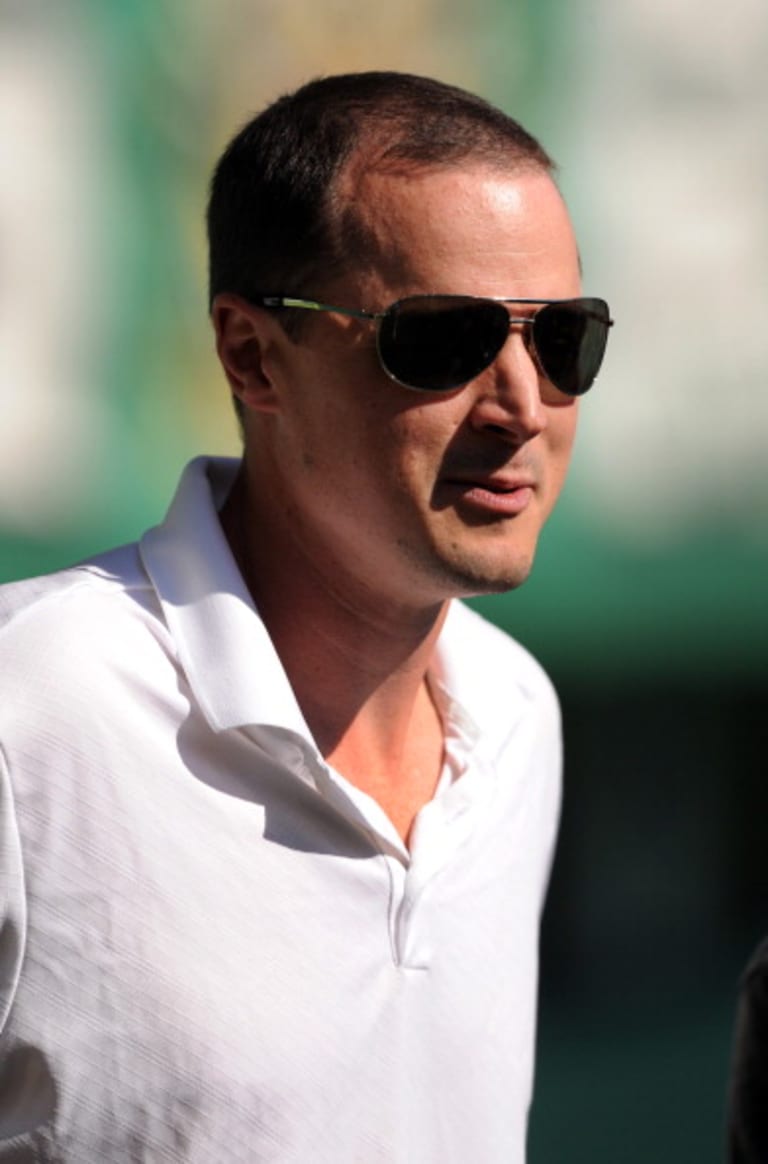
Portland Timbers owner Merritt Pauslon was fined an MLS-record $25,000 for negative comments about referees in 2012, but now? "I think that what MLS has done with PRO is a big step in the right direction.” (Getty Images)
Seattle Sounders head coach Sigi Schmid – a man certainly unafraid to voice his criticism of referees when he feels they’ve missed a crucial call – is optimistic about the idea that fewer referees will get more games, and that will improve the level of officials. Eventually.
“I think that will pay out, but that's not going to pay out until 2014 or 2015 once these guys have gotten more games under their belts and getting more consistency,” Schmid says. “To have a guy referee in the league and only get 10 middles in a season doesn't make sense. Now when you have guys getting 25-30 middles in a year, in two years you're going to see a big difference.”
Both Paulson and Sarachan talk about the need to develop and improve officials, much like the same need with regard to players.
“How do we get referees – just like we do as coaches with players – how do we get them to the next level?” asks Sarachan. “How do we bring in some younger ones and incentivize the program and allow these referees to get a lot of games? It’s really about experience.”
READ: Road to the pros a long one for referees
Regarding the latter point, Walton mentions U.S. Soccer’s Platinum Group, which allows individual states to identify their best young referee candidates, who then receive financing, education and exposure to top-level competition. Of course it won’t happen overnight, Walton says.
“Unfortunately, referees aren’t on the shelf at Walmart,” he jokes. “You don’t stroll in and pull two or three off the shelf.”
As for developing the existing pool of officials, Paulson says he’s generally satisfied with PRO’s direction.
“We’ve lacked a full arsenal of tools to help officials improve,” he says. “But I think that what MLS has done with PRO is a big step in the right direction.”
The real fruits of the endeavor, Paulson continues, will be evident a few seasons down the line.
“Can I say that officiating has improved already?” he asks. “I certainly hear people talking about officiating a lot less. Or less, I’d say; maybe not a lot less.”
Says Sarachan: “I think the assistant refs and the guys in the middle, for the most part, have done a better job being consistent. That’s the biggest challenge, I think, is consistency – not having one good game and one game where they’re off. I think we’ve seen a little more consistency, and you’d like to think the program has helped that.”
Sarachan’s point was echoed by everyone who spoke on the record for this article – and by a few who didn’t. Consistency, both within a game, and from game-to-game, was the number one issue among MLSers when assessing the officiating.
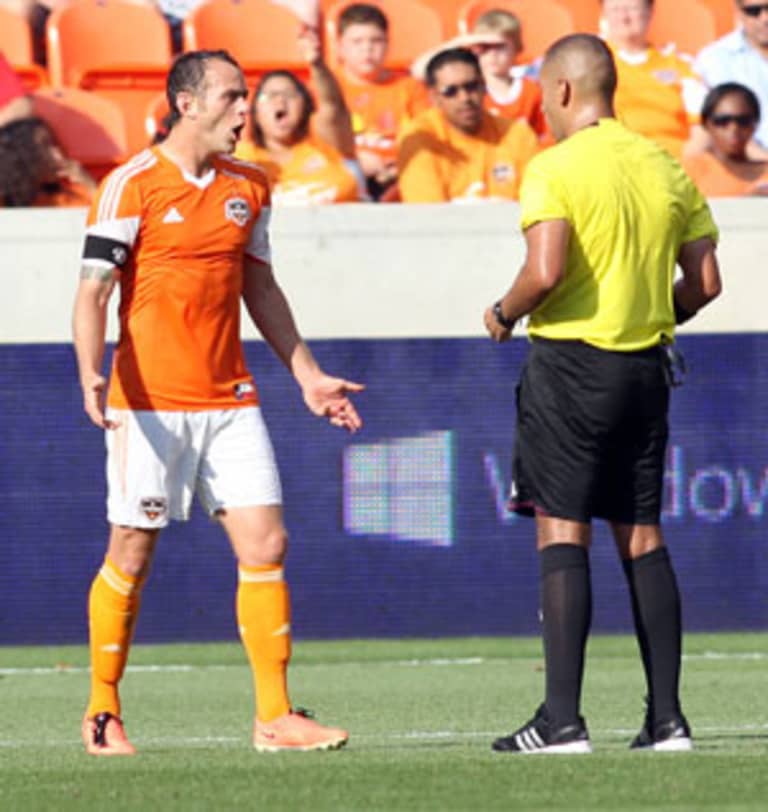
Houston Dynamo winger Brad Davis says the most important element of refereeing is conistency. "“[When] one team does one thing and it’s not called and then the other team does it and it’s a foul,” he says, “that’s when things get out of hand.”
(Getty Images)
According to Houston winger Brad Davis – who was issued a red card late in the Dynamo’s 1-1 draw against Colorado on April 28 and was clearly flummoxed by head ref Juan Guzman’s decision – players want consistency more than anything.
“Each referee is going to be different, and we understand that, just like every player is different,” Davis says. “[But] once you start calling a game a certain way, it’s got to stay that way. It makes it easier for us to play when a ref is calling a game consistent.”
INFOGRAPHIC: Cards, fouls, goals and more
Davis acknowledges that strides have been made, but says this area remains an issue, and is a crucial element in a referee’s control over a game.
“[When] one team does one thing and it’s not called and then the other team does it and it’s a foul,” he says, “that’s when things get out of hand.”
Rodriguez also acknowledges this is an opportunity area for PRO.
“I think we expect to see a little bit more of a standardization of interpretation of the game,” he says. “Of what we do and do not want to see allowed in our game.”
---
Not to be forgotten in this, or any discussion of referee performance, is the simple fact that it’s a very difficult job. There’s a massive field to cover, 22 players to keep track of and decisions are frequently of the bang-bang variety, requiring a split-second judgment.
“And we don’t referee in color HD, 52-inch screen TV,” Walton says.
On top of all that, soccer’s rules – Walton calls them “the law” – are actually often subject to interpretation. And the referee is often cast into the role of “arbiter,” to use Walton’s phrase.
“It’s no good having a referee who knows the law, but can’t administer the law in the manner in which it should be [administered],” he says, adding that making judgments on the field is akin to the role of a neighborhood cop.
“A good police officer knows how to deal with a guy who’s just [showing] a bit of bravado and a guy who’s being a downright nuisance,” he says. “And a good referee has a quality of managing the occasion, and managing the individual. That’s something you won’t read in the law book.”
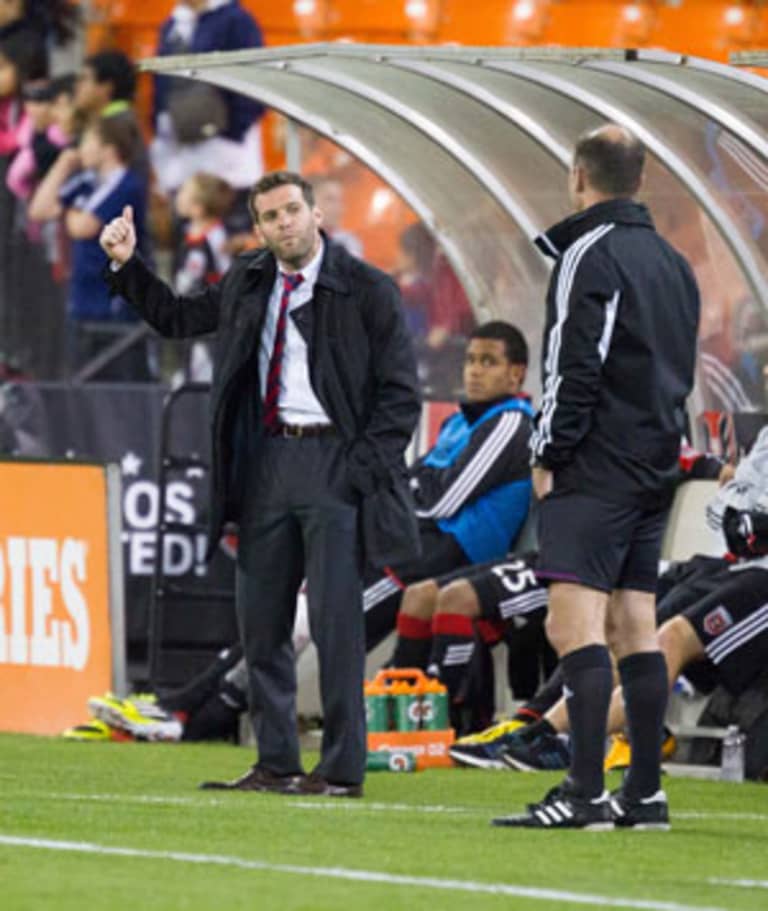
D.C. United head coach Ben Olsen had a reason to gripe during the 2012 postseason, when PRO stated Houston Dynamo defender Andre Hainault should have been issued a red card, but was issued a yellow instead. (Getty Images)
But what of the game-changing calls – critical offside flags, penalty decisions, red cards, goal-judgment calls – that draw the most ire from players, coaches and fans? Improving referee performance in this department is a central part of PRO’s agenda.
Walton’s staff combs each MLS match and highlights the game-changing decisions, and if they conclude the official hasn’t made the right decision, then they look at the degree of difficulty of the call, factoring in several elements, and ultimately decide if the ref’s mark for that game should be adjusted based on the game-changing call.
They’ve also gone public when they feel a referee has blown such a call, with no bigger instance than during last year’s Eastern Conference Championship, when they determined Ricardo Salazar should have given Houston defender Andre Hainault a red card for a breakaway tackle on D.C. United’s Rafael Augusto in the first game of the series.
Hainault was issued a yellow card and stayed on the field, and went on to score a second-half goal that keyed Houston’s 3-1 win.
After consistency, the issue that came up most regularly in conversations about the refs was that of communication. Players would like to get clear signals from officials during games, and more acknowledgment, even if it’s just to say, “I hear you, but I don’t agree with you.”
YOU MAKE THE CALL: Was Kenny Cooper's goal resolved?
And many people in the league would like to see more civility.
“I think that ‘respect’ is a word I don’t hear enough,” says Real Salt Lake president Bill Manning. “There needs to be a general respect on both sides.”
Surely the fourth officials of this league would agree with that, given the kind of “communication” we sometimes see directed at them on MLS sidelines.
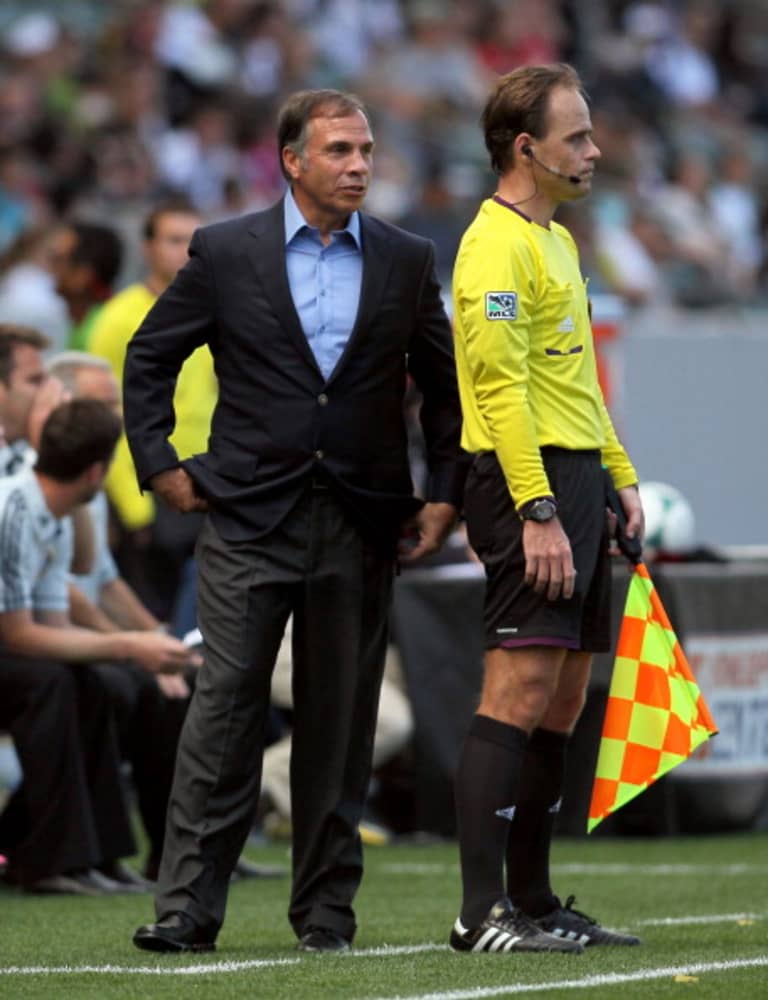
LA Galaxy head coach Bruce Arena looms over a assistant referee during a recent MLS match. Says Timbers owner Merritt Paulson: “[The fourth official] is not even the one who’s making a lot of the calls that they’re upset about.”(Getty Images)
“That guy might as well be in a Kevlar suit,” says Paulson. “And he’s not even the one who’s making a lot of the calls that they’re upset about.”
On the other hand, Paulson would like to see more accountability from MLS refs, and more communication about why calls were made. Right now, each MLS team designates a “pool reporter” at its home games who is authorized to request an explanation from the referee crew if there is a controversial decision during the game.
But there are no standards for how thorough or specific the explanation has to be, often times leaving a lack of clarity between the decision-makers and the ones most affected by their calls.
For PRO’s part, they want to involve referees in offseason league and team meetings, not only to talk about what they do and why, but also “to get the human element in front of the players, and the coaches,” says Walton. “So they don’t just see us as a guy turning up on a Saturday with a black uniform to ruin their afternoon.”
---
The greatest challenge ahead for PRO, as Walton sees it, is managing people’s expectations. While PRO’s impact will require a few seasons to measure accurately, the organization has, in fairly short order, established a framework for the rapid improvement of officiating in North America.
“What we’re doing at the moment is establishing some principles,” says Walton. “We make mistakes, of course we do – and we will continue to make mistakes – but what we’re looking for is a direction to go in, and I think that the officials have now found that direction and are working towards it.”
The structure is in place, says Walton. “All we need now is to build on that.”

